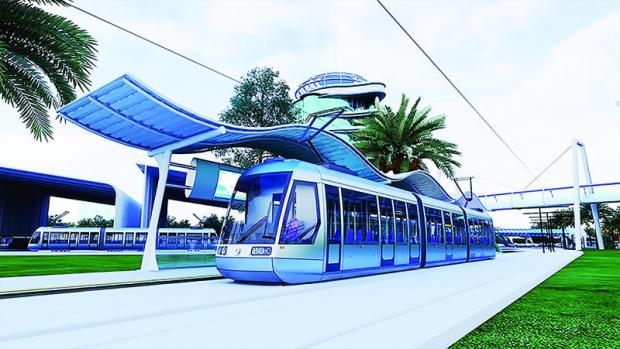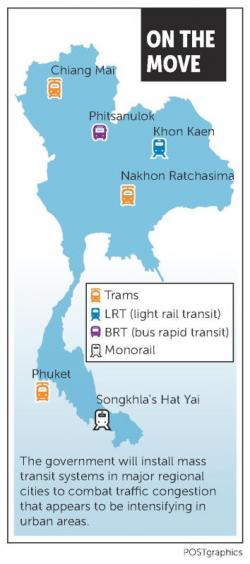
The government has launched a major review of an ongoing study into the need for mass transit systems in densely populated areas of Thailand with the aim of getting projects underway as quickly as possible.
The ambitious multi-billion-baht undertaking covers major urban areas in cities like Hat Yai and Khon Kaen and popular tourism destinations like Phuket and Chiang Mai.
Transport Minister Arkhom Termpittayapaisith said the transit plans for Phuket were likely to get off the ground first as the project has been included in the 2017 budget and the design is under way.
The Mass Rapid Transit Authority of Thailand (MRTA) last year authorised a multiple feasibility study for rail projects in Chiang Mai, Nakhon Ratchasima, Hat Yai, Phuket and Khon Kaen, where traffic gridlock has worsened. The projects are also designed to serve the needs of industry and tourism.
Mr Arkhom said that local authorities or private companies could either invest jointly or solely in the projects from which they can directly benefit. They could handle either the construction or operations.
Chaiwat Thongkamkoon, director of Transport and Traffic Policy and Planning (OTP), said the study, which is scheduled to be finished in March, will outline suitable mass transit systems for each city. They include bus rapid transit (BRT), trams, monorails and light rail transit (LRT).
The study will also underline how the projects can be managed and the most suitable investment approaches, he said.
Mr Chaiwat said the OTP is reviewing other studies of provincial mass transit projects carried out seven or eight years ago. An update was needed because circumstances involving population density and landscaping have changed.
For example, he said that a 2009 study showed the BRT system would solve commuting problems in Chiang Mai's Muang district. However, elements of the town have changed and more information is needed.
"Today, traffic in major cities is becoming worse, so the prior study must be reviewed to find a suitable solution," Mr Chaiwat said.
He said an initial study for Phuket showed it needed a tram system, to be developed under a public-private partnership (PPP) agreement. A budget of 20 billion baht was needed for the project.
The government would invest in rail construction and system installation, while local authorities would be responsible for operating the trams under a subsidiary, similar to the way the Bangkok Metropolitan Authority authorised its wholly owned company Krungthep Thanakom Co to take care of the BTS skytrain.
A similar project could materialise in Nakhon Ratchasima, Mr Chaiwat said.
Meanwhile, Phitsanulok is interested in a BRT system and a budget for a feasibility study has recently been approved.
In Khon Kaen, the private sector was keen on setting up a fund to sponsor an LRT system, Mr Chaiwat said. Major companies including department stores are drawn to the idea as it would provide transit services to their businesses.
The state, however, would need to sponsor construction and negotiate with the Department of Highways (DOH) to use its land.
In Chiang Mai, the mass transit project has been strongly opposed by operators of public mini buses known as songthaews, Mr Chaiwat said. But the authorities agreed the tram project is suitable for downtown Chiang Mai.
Tram tracks would not stop other vehicles from using the transit system's roads. It was an economically viable project which could run for as long as 30 years, Mr Chaiwat said, adding there would be four or five tram routes.
MRTA deputy governor Theeraphan Tachasirinugune said the drafting of a tram design for Phuket is nearly complete. The OTP and the DOH are discussing ways to turn median strips into tram tracks.
The project will be tabled in cabinet for approval either this month or next. Once approved, the MRTA will take charge of the project.
Niran Ketkaew, of the Bureau of Regional Transport and Traffic Promotion, said Phuket's tram service would be able to handle up to 30,000 people per round trip.
The investment would be more affordable than a monorail while warding off criticism of any elevated projects obstructing scenery.
The tram service will start from Thanoon train station in Phangnga to Ban Tha Chat Chai in Phuket's Thalang district.
There will be only one elevated section in front of Phuket airport. A total of 23 stations will be built along the 60km route.
"The trams will play a key role in addressing traffic congestion there," Mr Niran said.
In Hat Yai, the Songkhla provincial administrative organisation has proposed a 12km monorail project, Mr Niran said. An environmental impact assessment study is now underway before the project is presented to the Transport Ministry.
Khon Kaen has a plan to develop an LRT system from Ban Samran to Ban Thaphra along Mittraphap Road, he added.

